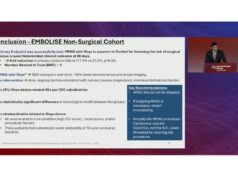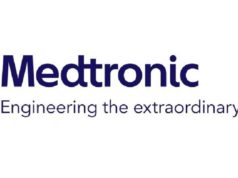 Arsenal Medical today announced the initiation of the EMBO-02 clinical study of NeoCast in the treatment of chronic subdural haematomas (cSDHs). NeoCast is a first-of-its-kind, shear-responsive, non-adhesive, solvent-free, liquid embolic material designed for deep distal penetration, according to a press release from the company.
Arsenal Medical today announced the initiation of the EMBO-02 clinical study of NeoCast in the treatment of chronic subdural haematomas (cSDHs). NeoCast is a first-of-its-kind, shear-responsive, non-adhesive, solvent-free, liquid embolic material designed for deep distal penetration, according to a press release from the company.
The EMBO-02 study is enrolling up to 10 subjects at three sites in Australia, and the first of these patients has been enrolled at Monash Health (Melbourne, Australia).
“We are encouraged by our experience with NeoCast in cSDH,” said Monash Health’s Lee-Anne Slater, the principal investigator of both the EMBO-01 and EMBO-02 trials. “The initial case was an excellent translation of middle meningeal [artery] embolisation [MMAe] from EMBO-01, which studied hypervascular brain tumours. NeoCast performed predictably throughout injection and provided robust distal occlusion, further demonstrating its unique properties, which sets it apart from current embolic products.
“Better performing, innovative solutions are needed to manage this significant neurovascular condition. We look forward to continuing enrolment in EMBO-02 and uncovering the potential for NeoCast for this population.”
Upma Sharma, president and chief executive officer (CEO) of Arsenal Medical, added: “Recent data suggest MMAe procedures for treating cSDH are estimated to rapidly increase in frequency and are expected to surpass those for large-vessel stroke. The launch of EMBO-02, our second study with NeoCast, is an important milestone for the company and a next step toward delivering a differentiated embolic solution. I am grateful to all of our clinical and scientific collaborators who are helping us to advance our next-generation embolic material—and, most importantly, the patients who participate in these important studies.”
EMBO-02 is an open-label, multicentre, prospective clinical trial intended to evaluate the early safety and feasibility of NeoCast to embolise target vessels of a subject’s MMA in order to treat cSDH, and potentially reduce haematoma recurrence. Its primary endpoints include: safety, defined as freedom from device-related disabling stroke or neurological death within 30 days of the embolisation procedure; and feasibility, defined as the successful injection of NeoCast into the MMA, resulting in complete occlusion at or distal to the point of embolysate injection.









